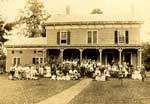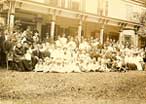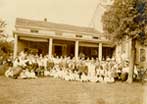So, you’ve decided to grow your own
vegetables. You’ve been to the library, brushed up on gardening, found a nice sunny
spot in your yard near a water source, and gathered all the necessary tools together.
You’re a Future Farmer of America!
Next, you turn the soil and remove the rocks, weeds and grass. You
rake the soil to break up the clods and add the correct mix of fertilizer. After planting
the seeds or seedlings, you mulch to keep down the weeds, water and wait. After a couple
of weeks, the plants are up and growing. The site is beautiful…working hand-in-hand
with Mother Nature, you imagine the bountiful harvest you will enjoy at summer’s end.
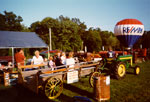 One day, however, you find a sweet little brown bunny in
your garden happily nibbling on your lettuce leaves! You assess the damage and take
immediate action; a three-foot high chicken wire fence goes up. Your seedlings are safe
for awhile, until that voracious fat ground hog burrows under your fence and eats several
rows of vegetable plants down to the earth. With fury and indignation, a much stronger,
deeper and taller fence goes in, with a gate for human access. However, that doesn’t
keep out the slugs and beetles! Another trip to the garden center protects the few
remaining tomato plants until they’re just the right height for…you guessed it,
the neighborhood deer population!
One day, however, you find a sweet little brown bunny in
your garden happily nibbling on your lettuce leaves! You assess the damage and take
immediate action; a three-foot high chicken wire fence goes up. Your seedlings are safe
for awhile, until that voracious fat ground hog burrows under your fence and eats several
rows of vegetable plants down to the earth. With fury and indignation, a much stronger,
deeper and taller fence goes in, with a gate for human access. However, that doesn’t
keep out the slugs and beetles! Another trip to the garden center protects the few
remaining tomato plants until they’re just the right height for…you guessed it,
the neighborhood deer population!
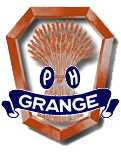 Such are the problems we suburbanite Yorktowners face today. However, for the
people of Yorktown a hundred years ago, in a mostly farming community, the growing season
presented itself with much greater challenges. It was for that reason the National Grange
organization (officially known as the Order of Patrons of Husbandry) was begun in 1867.
Such are the problems we suburbanite Yorktowners face today. However, for the
people of Yorktown a hundred years ago, in a mostly farming community, the growing season
presented itself with much greater challenges. It was for that reason the National Grange
organization (officially known as the Order of Patrons of Husbandry) was begun in 1867.
Founded by a Minnesota farmer and activist, Oliver Hudson Kelley,
the Grange was initially similar to the unions that were organizing industrial workers
across the country. Farmers were at the mercy of merchants, both for much needed farm
supplies and marketing their crops. The Grange provided lobbyists who worked for
farmer’s interests, promoted social interaction among rural residents with the
building of halls, and were instrumental in improving education to farm families. Rural
Free Delivery, the Cooperative Extension Service, and the Farm Credit System all developed
as a result of Grange efforts.
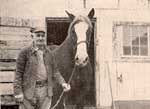 In December 1898, Worthy Deputy A.E. Hall of Amenia, NY met with a number of
representative farmers from the area to explore the possibility of organizing a Grange in
Yorktown. PH #862 was organized on December 30, 1898 and elected the following officers on
January 12, 1899: Master, George J. Griffin; Overseer, James N. Strang; Steward, John A.
Barnes; Asst. Steward, Lewis W. Mead; Chaplain, Wright A. Moseman; Treasurer, E. Munson
Frost; Gatekeeper, Samuel B. White; Ceres, Mrs. Floyd Q. White; Pomona, Alice M. Griffin;
Flora, Carrie Moseman; and Lady Asst. Steward, Mrs. John A. Barnes.
In December 1898, Worthy Deputy A.E. Hall of Amenia, NY met with a number of
representative farmers from the area to explore the possibility of organizing a Grange in
Yorktown. PH #862 was organized on December 30, 1898 and elected the following officers on
January 12, 1899: Master, George J. Griffin; Overseer, James N. Strang; Steward, John A.
Barnes; Asst. Steward, Lewis W. Mead; Chaplain, Wright A. Moseman; Treasurer, E. Munson
Frost; Gatekeeper, Samuel B. White; Ceres, Mrs. Floyd Q. White; Pomona, Alice M. Griffin;
Flora, Carrie Moseman; and Lady Asst. Steward, Mrs. John A. Barnes.
Other charter members were: Minnie U. Griffin, Floyd Q. White, James
E. Rice, Alfred Curry, Henry Strang, Albert Lee, Oscar Bennett, Henry G. Kear, William E.
Vail, Charles W. Flewwellin, Philander Moseman, and Elmer E. Reynolds.
By the first summer, membership had reached about 100 and the
Yorktown Grange’s first picnic was held. Meetings were conducted at Tompkins Hall on
what is today Commerce Street near Railroad Park. One of the large projects undertaken was
cooperative buying and selling, until about 1924 when the number of farms had dwindled.
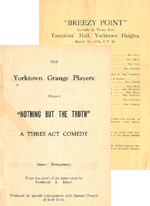 The Grange
became a social organization. It was a place to debate the topics of the day, to gather
for community suppers and clambakes, an outlet for artistic expression (the Dramatic Club
presented many popular plays of the day like "Nothing But The Truth" and
"Breezy Point"), and sponsor to other organizations such as the Boy Scouts, and
4-H.
The Grange
became a social organization. It was a place to debate the topics of the day, to gather
for community suppers and clambakes, an outlet for artistic expression (the Dramatic Club
presented many popular plays of the day like "Nothing But The Truth" and
"Breezy Point"), and sponsor to other organizations such as the Boy Scouts, and
4-H.
In 1920, the Yorktown Grange purchased its first hall from Theodore
Purdy on April 1st and held the first Grange Fair on October 9th in
the new hall. By 1946 the crowds attending the fair grew so large that it was moved to the
Yorktown School (YCCC building). 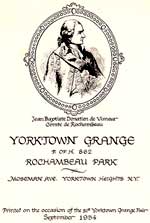 The
fair continued to expand and grow, along with the crowds and Grange membership. In January
1954, land was purchased and the first meeting and fair in the new location was held that
September. According to Arthur Lee at the 60th Anniversary Celebration,
"Three days of heavy rain made the new grounds knee deep in mud, and the fair a
financial failure; not exactly an auspicious beginning." Many who have attended the
fair in the succeeding 45 years will remember similar conditions!
The
fair continued to expand and grow, along with the crowds and Grange membership. In January
1954, land was purchased and the first meeting and fair in the new location was held that
September. According to Arthur Lee at the 60th Anniversary Celebration,
"Three days of heavy rain made the new grounds knee deep in mud, and the fair a
financial failure; not exactly an auspicious beginning." Many who have attended the
fair in the succeeding 45 years will remember similar conditions!
The Grange Fairground was named Rochambeau Park at its dedication
ceremony that September, in honor of the Comte de Rochambeau, General of the French Army
during the Revolutionary War, who was encamped in Yorktown twice during the war and was
instrumental in the American victory. 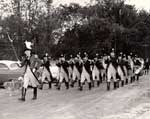 Two years later, the Westchester Historical Society was entertained at the
Park by the Yorktown Grange members, replete with historic costume, fife and drum music
and a special guest, the representative of the French Ambassador, Major Marcel Madac.
Two years later, the Westchester Historical Society was entertained at the
Park by the Yorktown Grange members, replete with historic costume, fife and drum music
and a special guest, the representative of the French Ambassador, Major Marcel Madac.
This year, on September 10, 11, 12, and 13, the Grange will present
its 75th Fair, rain or shine. Along with its long-time traditions of judging
produce and baked goods, country crafts and art, 4-H projects, and farm animals will be
the more contemporary addition of amusements, rides, circus acts, vendors selling food and
gifts, and music of all kinds. 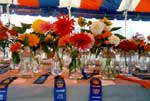 The
crowds will be enormous, the mood festive, and once again the Yorktown Grange will unite
us in a spirit of community.
The
crowds will be enormous, the mood festive, and once again the Yorktown Grange will unite
us in a spirit of community.
And, if any of your garden vegetables survived pests and the plague,
you can enter them in the judging. You might go home with a blue ribbon for your efforts!
Click here
to visit the Yorktown Grange Fair web site.
The Yorktown Historical Society updates the home page with seasonally appropriate
articles and information. Click here to
read our past issues.
 One day, however, you find a sweet little brown bunny in
your garden happily nibbling on your lettuce leaves! You assess the damage and take
immediate action; a three-foot high chicken wire fence goes up. Your seedlings are safe
for awhile, until that voracious fat ground hog burrows under your fence and eats several
rows of vegetable plants down to the earth. With fury and indignation, a much stronger,
deeper and taller fence goes in, with a gate for human access. However, that doesn’t
keep out the slugs and beetles! Another trip to the garden center protects the few
remaining tomato plants until they’re just the right height for…you guessed it,
the neighborhood deer population!
One day, however, you find a sweet little brown bunny in
your garden happily nibbling on your lettuce leaves! You assess the damage and take
immediate action; a three-foot high chicken wire fence goes up. Your seedlings are safe
for awhile, until that voracious fat ground hog burrows under your fence and eats several
rows of vegetable plants down to the earth. With fury and indignation, a much stronger,
deeper and taller fence goes in, with a gate for human access. However, that doesn’t
keep out the slugs and beetles! Another trip to the garden center protects the few
remaining tomato plants until they’re just the right height for…you guessed it,
the neighborhood deer population! So, you’ve decided to grow your own
vegetables. You’ve been to the library, brushed up on gardening, found a nice sunny
spot in your yard near a water source, and gathered all the necessary tools together.
You’re a Future Farmer of America!
So, you’ve decided to grow your own
vegetables. You’ve been to the library, brushed up on gardening, found a nice sunny
spot in your yard near a water source, and gathered all the necessary tools together.
You’re a Future Farmer of America!
 Such are the problems we suburbanite Yorktowners face today. However, for the
people of Yorktown a hundred years ago, in a mostly farming community, the growing season
presented itself with much greater challenges. It was for that reason the National Grange
organization (officially known as the Order of Patrons of Husbandry) was begun in 1867.
Such are the problems we suburbanite Yorktowners face today. However, for the
people of Yorktown a hundred years ago, in a mostly farming community, the growing season
presented itself with much greater challenges. It was for that reason the National Grange
organization (officially known as the Order of Patrons of Husbandry) was begun in 1867. 
